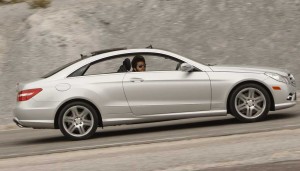
Many luxury buyers are moving down-market, says a senior Mercedes-Benz official, opting for the smaller E-Class instead of the top-line S-Class.
As bad as 2009 has been for the overall U.S. car market, it’s been especially tough for high-line manufacturers, like Mercedes-Benz.
Where past recessions have left luxury brands largely unscathed, most premium brands have suffered hefty double-digit downturns, this year. And though 2010 looks likely to be a bit better, the luxury market may have gone through some significant and potentially permanent changes, Mercedes officials suggest.
“If anything, 2009 was a reset year,” said Steve Cannon, the German maker’s U.S. marketing chief, during a visit to Detroit.
For one thing, it’s forced manufacturers like Mercedes to rethink the way they pitch potential buyers. Over the last several decades, the luxury segment has increasingly turned to incentives and, in particular, subsidized leasing, to attract buyers who really didn’t belong in the luxury segment, said Cannon, who admits the cost has been “too high.”
Mercedes has slashed back on leasing, trimming rates from as much as 70% of its sales to a healthier, if still sizable 50%, noted Cannon. But, he adds, “When you get out of the lease business, you volumes suffer.” That’s been particularly obvious in the markets hardest hit by the recession, notably Southern California, where Canon admits, “All of us have inflated the luxury market with leasing.” Inflated housing prices also inflated the bubble, a sizable share of luxury car buyers using home equity loans to finance their purchases.
The southern half of the Golden State had become one of the world’s largest luxury markets, particularly at the high end. A full 25% of Mercedes’ high-performance AMG models were sold in Southern California, over the past decade. But that’s shifted sharply, this past year, with New York now Mercedes’ number one market, with the brand’s sales slipping by a third in the greater Los Angeles region.
“Now,” said Cannon, “it’s only the natural luxury customers who are buying in Southern California, not the customers stretching up” beyond their means.
For the full year, Mercedes expects to sell about 190,000 cars, trucks and crossovers in the U.S., a 17% drop from 2008. But the automaker has actually been able to gain share in the luxury segment, its share climbing to 1.86% of the overall American market.
That’s because its key competitors reported even larger declines. BMW has so far posted a 21% decline through the end of November, and is forecast to sell only about 5,000 vehicles more than Mercedes. Luxury segment leader Lexus is so far down 24%, and should finish the year, Cannon forecast, with about 200,000 sales, or just 10,000 more than Mercedes, making this the tightest luxury horse race in years.
In fact, Cannon conceded some surprise by the performance of Toyota’s luxury brand. Despite some quality problems and a massive recall to replace accelerator pedals that can catch on floor mats and lead to unintended acceleration, “Lexus buyers have been surprisingly loyal,” said the Mercedes executive.
But so are Mercedes owners, a recent study showing the brand with a 67% customer retention rate, number one in the industry and, in fact, an industry all-time high. Mercedes also ranked third in the latest J.D. Power Sales Satisfaction Index, on a par with Lexus, though it still lags its Japanese rival in the critical Power Initial Quality Survey, a measure of “out of the box” quality.
Cannon said that even when the luxury market starts to turn around, there will likely be some significant shifts from years past. “I think the new pragmatism stays,” he told TheDetroitBureau.com, suggesting that will lead buyers to rethink what they’re willing to spend. Though there’s been a bit of an up-tick, recently, in demand for the flagship S-Class, many buyers are moving down-market, a bit, shifting to the more affordable E-Class, for example.
Meanwhile, Mercedes – like its luxury rivals – will have to make other changes to deal with tough new emissions and fuel economy regulations.
“We have to get our customers to stop focusing on displacement, Cannon added. For 2011, the automaker will shift from the big 5.5-liter V8s offered in models like the E550 and S550 to a smaller 4.6-liter powerplant. But Mercedes may retain the 550 designation to keep status-conscious buyers happy. Ironically, the smaller displacement engines will boost horsepower from 382 to 420, even while improving fuel economy an estimated 5% to 8%, noted the marketing executive.
To boost its fleet fuel economy average also will mean more emphasis on diesels, which currently account for between 15% and 20% of sales on the models where the oil burners are offered, such as Mercedes’ ML and GL SUVs.
Mercedes has consciously minimized the premium buyers pay for diesels, averaging around $1,500 or barely a third what some brands, like BMW, have charged.
Look for diesels to expand into other parts of the Mercedes line-up, said Cannon, revealing a new C-Class version will deliver more than 40 mpg, the sort of number one would typically expect from a stripped-down econobox, not a well-equipped German luxury sedan.
